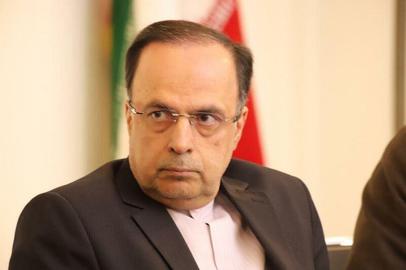The case of Hamid Nouri, a former prison official now two weeks into his criminal trial in Sweden for war crimes and murder over his role in Iran’s 1988 prison massacre, has begun to garner international attention. Over the weekend Iranian ambassador to Sweden Ahmad Masoumifar issued a sudden excoriation of Swedish prosecutors involved in the case, alleging – without providing evidence – that they had violated the defendant’s human rights.
On Saturday, Masoumifar tweeted: “After 20 days of follow-up I managed to meet the Iranian citizen in prison. Evidence of violence and violation of the Convention against Torture and Other Cruel, Inhuman or Degrading Treatment or Punishment (1984), Articles 12, 1 and 16, Civil and Political Rights (1966) Articles 10, 9, 7 and 14, and the European Convention on Human Rights (1950) Articles 5, 3 and 7.
“A complaint has been submitted by lawyers to the judicial authority and in a note to the Ministry of Foreign Affairs and the Ministry of Justice, I have called for an independent investigation into violations of the prisoner’s rights, the obstruction of medical examination, desecration of faith and physical and mental torture of Iranian citizens.”
Masoumifar declared that he would be following up on the issue until an acceptable conclusion was reached.
The intervention was startling as so far, Iranian officials have largely ignored the Nouri case – presumably fearing for their reputation as current president Ebrahim Raisi is also directly implicated in the mass slaughter of 1988. Several key witnesses believe that prior to the trial getting under way, Nouri was confident of being freed via a prisoner exchange.
If the Swedish justice system has somehow violated Nouri’s rights, the issue could doubtless escalated to the European Court of Human rights. And unlike in the Islamic Republic, alleging torture by one’s prosecutors does not lead to a heavier sentence for the defendant.
Ambassador for a State Built on “Cruel, Inhuman and Degrading” Punishments
With some hypocrisy, Masoumifar cited three international conventions, two of which Iran is also technically a signatory to: the Convention against Torture and Other Cruel, Inhuman or Degrading Treatment or Punishment, the International Covenant on Civil and Political Rights and the European Convention on Human Rights.
The UN Convention against Torture was ratified by the UN General Assembly in December 1984 and went into force in June 1987. At present, most countries in the world have signed this convention and their parliaments have approved it. Iran, however, is one of a handful of countries to have signed the Convention without then enacting its provisions through the legislature, meaning it remains a statement of intent only.
In the terminology of Islamic jurisprudence, the domestic laws of the Islamic Republic refer to these kinds of punishments as ta’zir: an entrenched part of Iran’s Islamic Penal Code and a key aspect of sentences regularly issued by the courts.
Execution, flogging and dismemberment are among the cruel, inhuman and degrading punishments that the UN convention has banned. This ban has since become an international norm, whereby in the 21st century, any government is expected to refrain from enacting these kinds of sentences whether it has signed the convention or not.
The Islamic Republic, however, not only has not accepted this convention but considers such medieval punishments – as well as and Qisas, “retaliation in kind”, which allows the victims of crimes to issue an equal punishment to the perpetrators on the principle of “an eye for an eye” – as immutable, divine instructions. Inhuman and cruel punishments are part and parcel of Islamic jurisprudence.
In his tweet, Ahmad Masoumifar also referred to articles 7, 9, 10 and 14 of the 1966 International Covenant on Civil and Political Rights. Article 7 of the covenant states: “No one shall be subjected to torture or to cruel, inhuman or degrading treatment or punishment.” Article 9 bans arbitrary arrests and emphasizes the due and just process of law after the arrest. “All persons deprived of their liberty shall be treated with humanity and with respect for the inherent dignity of the human person,” declares Article 10. Finally, Article 14 enumerates the rights of detainees, such as equality before the law, “presumption of innocence until proven guilty according to the law”, having “adequate time and facilities for the preparation of his defense and to communicate with counsel of his own choosing”, and “not to be compelled to testify against himself or to confess guilt”.
Iran joined this covenant at the time of Mohammad Reza Shah Pahlavi. The Convention is binding on states regardless of internal regime change, meaning the Islamic Republic must – in principle – also comply with it. But the courts today pay no regard to these obligations. Televised “confessions”, extracted under various forms of mental and physical torture, often form the basis of verdicts issued against the defendants. Again, they are an inseparable part of the judicial process in Iran.
The Islamic Republic customarily refuses to send political prisoners for medical treatment even if they desperately need it. One such political prisoner was Alireza Rajaei: judiciary officials refused to send Rajaei to hospital to be treated for an advanced malignant tumor and, as a result, he lost half of his face. In recent years, numerous political prisoners have also been sent to mental hospitals for protesting against their treatment, which led in at least one case to the death of a prisoner of conscience (Behnam Mahjoubi).
The Iranian ambassador also referred to the European Convention on Human Rights. This convention is not limited to European Union member states and thus Turkey, Britain and the Republic of Azerbaijan are among the participating countries. Iran’s penal code is a million miles away from its principles: one key item in the convention is the ban on executions.
The Islamic Republic Violates Even its Own Constitution
The Islamic Republic’s treatment of prisoners is not only contrary to its international commitments but to its own domestic law. Abbas Amir-Entezam, a predecessor of Ahmad Masoumifar as the Islamic Republic’s ambassador to Sweden, was recalled to Tehran four decades ago and spent most of the rest of his life hounded and harassed by the Iranian judiciary and security services. In one his last interviews before his death in 2018, Amir-Entezam recounted while he was still deputy prime minister in the interim revolutionary government, guards at Evin Prison tied him and two of his cellmates to a donkey and hauled them through a crowd in a bid to destroy their last shred of dignity.
The Islamic Republic would not hesitate to treat Ahmad Masoumifar or anybody else the same way today if it wanted to. Just last week, six prominent Iranian lawyers and civil rights activists were detained as they prepared to file a lawsuit against the Iranian government and Supreme Leader Ali Khamenei for a litany of failings during the coronavirus pandemic. According to the constitution, Iranian citizens have the right to ask the courts for justice.
In the European Union, Hamid Nouri enjoys the guarantee if his rights as a defendant have been violated, and if the Swedish justice system fails to address these violations — an unlikely assumption — the European Court of Human Rights is there to follow up the charges. Not so in his country of birth.
On the contrary, the Islamic Republic has such a horrifying record in human rights that it doesn’t even allow Iranian citizens to file a lawsuit against the governing parties they pay for, let alone handle such a lawsuit justly and without bia,s or respect the rights of a prisoner that Iranian ambassador to Sweden wants, and has every right to want, for Hamid Nouri, who has been charged with war crimes.
Related Coverage:
Expert Witness: Hamid Nouri's Trial Unmasks a Decade of Brutality
Lawyers Arrested for Trying to Sue Iranian State Over Covid-19
Prosecutors Describe Prison 'Corridor of Death' at Hamid Nouri Trial
Hamid Nouri's Trial: Where Is Siamak Toubaei?
Hamid Nouri Trial Opens in Stockholm
'The Nation is a Plaintiff': Scores of Iranians to Testify in Case Against Hamid Nouri
Hamid Nouri to Face Trial for War Crimes in Sweden Over 1988 Massacre of Iranian Prisoners
Iranian Ex-Prisoners Recall 'Courier of Death' Hamid Nouri Ahead of Sweden Trial
visit the accountability section
In this section of Iran Wire, you can contact the officials and launch your campaign for various problems



























comments